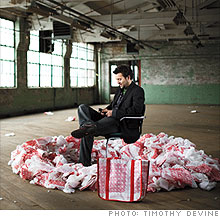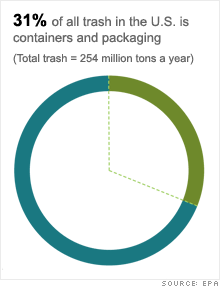Garbage mogul makes millions from trash
With a brilliant business model built around recycling, TerraCycle will either go big or go broke.
 |
| TerraCycle CEO Tom Szaky: "We're on the edge of bankruptcy and of being a huge success at the same time." |

TRENTON, N.J. (Fortune Small Business) -- In a sprawling former suitcase factory in New Jersey, a camera crew is filming entrepreneur Tom Szaky and his company, TerraCycle, for a new reality TV show. Ten of the recycling firm's 46 employees sit around a table awaiting Szaky's next challenge. "So, guys," says Szaky, reaching into the pocket of his corduroy jacket and tossing a used toothbrush onto the table. "What are we going to do with this?"
You could ask the same question about every piece of trash in this 250,000-square-foot warehouse. Those boxes of Capri Sun juice pouches will become pencil cases. Circuit boards will be reincarnated as picture frames and clocks. Oreo wrappers will morph into kites.
"We want to be the Wal-Mart of garbage," says Szaky, 26. Today's order of business: Toothbrush manufacturer Colgate-Palmolive (CL, Fortune 500) is prepared to ink a recycling deal if Szaky's team can dream up the right product. Their ideas include bending the toothbrushes into bracelets, purse handles and toothbrush holders.
Creative recycling like this has helped double TerraCycle's revenue every year since 2004. Sales are likely to hit $15 million this year. Meanwhile, Garbage Moguls, the reality-show pilot, will air on the National Geographic Channel on Earth Day, April 22, and may be turned into a series. Szaky's TerraCycle memoir, Revolution in a Bottle, was published by Penguin in February. And he can boast new agreements to make tote bags out of cloth scraps from Brooks Brothers, coffee sacks from Starbucks (SBUX, Fortune 500) and film from Warner Bros.
Yet all is not well in the land of garbage. Despite its brilliant business model - shipping free junk in by the truckload, then spinning it into gold - TerraCycle is low on cash. In 2008 the company lost $3.5 million. TerraCycle's capital levels are always trailing behind Szaky's restless ambition, and the company's short history is filled with crises.
As the cameras roll, Szaky strikes a dire note. "We are not stable," he tells his team. "We're on the edge of bankruptcy and of being a huge success at the same time." Right now, he estimates, the company has six weeks before it runs out of cash.
Both Szaky and TerraCycle reached this point via circuitous routes. Born in Hungary under the Communist regime, Szaky fled with his parents to Toronto in 1986. They were both doctors, but Szaky had entrepreneurship in his blood. At the age of 14, he started a business designing Web sites. One of his clients, serial entrepreneur Robin Tator, would later co-found TerraCycle.
In 2002 Szaky was a freshman at Princeton when he heard about a friend's discovery: If you fed organic waste to earthworms, they produced fertilizer that cannabis plants seemed to love.
Szaky smelled a strong business model. First, if it worked for pot, it would work for other plants. Second, he could create a salable consumer product out of garbage. TerraCycle was born.
From that point on, Szaky was a man obsessed. He paid a Florida inventor $20,000 for a contraption that housed millions of worms and fed waste to them on conveyor belts. He won business plan competitions, found investors, dropped out of school and ramped up production. Only then did Szaky realize he had no money left to design and make packaging for his precious worm poop.
That led to his second breakthrough. Out of desperation - and not knowing it was illegal - Szaky started raiding recycling bins for soda bottles. The bottles came in four standard sizes, which meant he could run them through a bottling machine. To build up a surplus of bottles, he persuaded church and school groups to form "bottle brigades," which would collect bottles in their neighborhoods - legally - in return for small donations.
The unusual recycled packaging - worm poop in Coke (KO, Fortune 500) bottles! - helped TerraCycle's fertilizer stand out from the crowd. By 2007 it was being sold at Home Depot (HD, Fortune 500), Target (TGT, Fortune 500) and Whole Foods (WFMI, Fortune 500). But Szaky had decided that worm fertilizer was a niche product that would never grow faster than 20% a year - not bad, but not the explosive growth for which he had dropped out of Princeton.
That's when Seth Goldman, the founder and CEO of Honest Tea, came along. Goldman had recently launched Honest Kids, a new line of organic juice in pouches, but feared that the nonrecyclable packaging would end up in landfills. "You guys are the trash people," he told Szaky. "Can you help me?"
Szaky bought some pouches and a sewing machine and got to work designing tote bags and pencil cases. Goldman loved them and agreed to fund "juice pouch brigades" at a penny per pouch. Szaky convinced Safeway (SWY, Fortune 500), Target and Walgreens (WAG, Fortune 500) to place orders for the bags and cases. The only problem: He had committed to manufacturing so many of them that he would need 10 million used pouches. The brigades were then delivering just 1,000 pouches a day.
After a few weeks of panic, co-founder Tator discovered the solution in British Columbia. The province, which required retailers to pay consumers who returned used juice pouches, was storing 20 million of them, pressed into sticky, smelly blocks. Tator persuaded the Canadian officials to let him take every last one to the U.S. in a fleet of rented trucks. "They looked at me like I was on crack," he recalls.
There was only one problem. The pouches Tator had procured were Capri Sun juice bags. A nervous Szaky booked a meeting with food giant Kraft (KFT, Fortune 500), owner of Capri Sun. The brand manager was charmed by his product ideas. Soon Szaky was fielding calls from the managers of other Kraft brands, such as Oreo and Chips Ahoy, who wanted to get rid of their waste packaging and bask in TerraCycle's green halo.
"The guy is full of great ideas," says Jeff Chahley, Kraft's senior director of sustainability. "How could you not like this?"
TerraCycle doesn't have the trash design market entirely to itself. Preserve, based in Waltham, Mass., has been making toothbrushes and razor handles out of Stonyfield Farm yogurt cups since 1996. Ecoist, which has its headquarters in Miami, started turning candy wrappers into handbags in 2004. But both remain very small plays.
"We're not the first people to think of this," admits Richard Perl, an executive coach who specializes in green companies and advises Szaky. "We are the first to scale it."
Two years after that first call from Honest Tea, TerraCycle sells 50 different products and is bringing more out at the rate of one a week. Szaky has agreements with nearly all of the 50 corporations that produce most of the world's nonrecyclable trash. (No other company holds the rights to reuse Coke and Pepsi (PEP, Fortune 500) bottles, for example.) The contracts are nonexclusive, and the original manufacturers reserve the right to nix products, especially when their branding is visible. But TerraCycle doesn't have to give them any kind of share in sales.
Meanwhile, the company's inventory is exploding. Szaky now gets help from 17,000 trash brigades with a total membership of 2.6 million, all working exclusively with his company. TerraCycle is set to install recycling systems in front of 10,000 big-box stores. Its suppliers are paying to have their brand names on the bins.
From the outside, it looks as if TerraCycle can do no wrong. "I think this is one of those rare instances where what seems too good to be true is actually that good," says Joel Makower, a green business consultant in Oakland.
But insiders know from experience that Szaky's frenetic dealmaking can lead to costly gambles. In 2008 Szaky reached an agreement with Target to collect its plastic bags and fuse them into a superstrong carrying bag, the ReTote, which Target is now selling for $5.99.
The ReTote was TerraCycle's highest-grossing product last year, but all 142,000 units were sold at a loss. Szaky decided that the only way to produce the ReTote in time was to outsource it to a domestic manufacturer that charged him $20 a bag. That accounted for much of the company's $3.5 million deficit in 2008. Szaky has since shifted ReTote production to Mexico, and he projects a $1 million profit for 2009 - assuming that TerraCycle can survive until the end of the year.
One brisk January evening, soon after the reality show wrapped, the cash-strapped Szaky made a presentation to a group of angel investors at an exclusive Manhattan club. He was looking to raise $3 million, which in turn would trigger the release of $2 million from other investors.
"If this meeting goes south," he fretted beforehand, "I'm in a boatload of trouble."
Szaky screened a rough cut of Garbage Moguls and delivered a treatise on the economics of garbage. Former Targus President Brett Johnson, the group's head and a new TerraCycle board member, told the group Szaky was "the most unique entrepreneur I've ever known."
Afterward, Szaky slumped against a wall, drained. "Let's see if they ante up," he said quietly.
It would be almost a week before the call came: The group would kick in up to $4 million. For now, the Tom Szaky reality show will go on. ![]()
Watch TerraCycle on video: The duke of rubbish
Green gift: Energy upstarts chase stimulus cash
Coca-Cola takes stake in Honest Tea
Ethics in a bottle: How Ethos Water got started
-
The Cheesecake Factory created smaller portions to survive the downturn. Play
-
A breeder of award-winning marijuana seeds is following the money and heading to the U.S. More
-
Most small businesses die within five years, but Amish businesses have a survival rate north of 90%. More
-
The 10 most popular franchise brands over the past decade -- and their failure rates. More
-
These firms are the last left in America making iconic products now in their twilight. More











